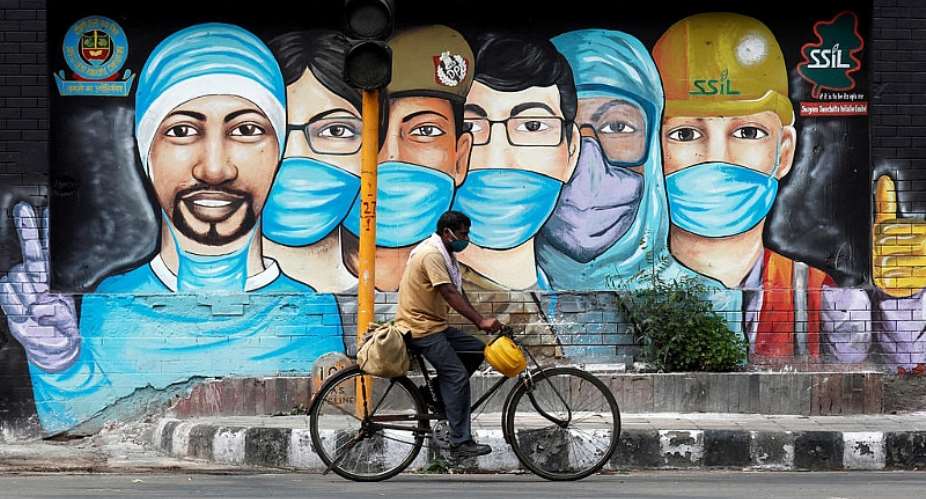With Covid-19 surging past the one million mark, Indians are shunning crowded buses and trains and taken to cycling that is witnessing a boom in sales.
Although most big cities such as Delhi, Mumbai, Kolkata and Chennai are not bicycle friendly and do not have dedicated pop-up cycle lanes, the pandemic has thrown up a huge crop of cycle enthusiasts.
Demand for cycles booms
Bicycle sales in the metros and smaller cities have witnessed a spurt during the coronavirus crisis with commuters looking for social distancing activity and an alternative to public transport.
“Covid-19 has given India an opportunity to visit different public transport options and come out with solutions, which are green, pollution-free, convenient and sustainable,” said Vishal Mahindru director of Vishal Cycles.
“It has given the bicycle industry an advantage.”
Sales of regular cycles to the high-end category are up by 30 per cent and manufacturers expect them to rise to 50 per cent in the coming months.
“The demand for cycles was greater than the supply because no one expected a spike so sudden and tall,” said Pankaj Munjal, chairman and managing Director, Hero Motors Company - of which Hero Cycles is a group company.
“The surge is particularly noticeable in the premium, semi-premium and recreational bike category which means more urban consumers are using bicycles,” added Munjal.
According to the All India Cycle Manufacturers Association, the manufacturers were unable to meet the demand because of limited production.
In Delhi, two app-based bicycle companies are expanding their services in the capital. Electric bike rental start-up Yulu already provides bikes at 250 metro stations and plans to expand. SmartBike is setting up bike stations in 130 neighbourhoods this year.
One major reason for the transition is also that public transport has not been operational for months.
The Delhi Metro, for instance, which ferries about 3 million passengers daily, remains shut and only 20 passengers are allowed in buses who have to adhere to strict social distancing norms. The same has been true for suburban trains in Mumbai that are always packed.
Cycling – gaining traction
The drastic drop in the carrying capacity of public transport has resulted in commuters and citizenry to take to cycles.
In the eastern city of Kolkata, the organization of cyclists which promotes eco-friendly travel, has demanded dedicated lanes for bicycles on city roads immediately after the police issued a notification allowing movement of cycles on city lanes only.
Given the spurt in cyclists, the ministry of urban affairs and housing has sent an advisory to all states and union territories asking them to come up with short, medium and long-term plans to promote cycling and walking, among other interventions, for safe urban transit systems post-Covid-19.
The advisory said cities across the world were ramping up their cycling systems in response to the pandemic.
Authorities anticipate that due to the social distancing norms, the capacity of public transport would be utilised at 25 to 50 per cent of pre-coronavirus levels.
Such dramatic changes in demand and supply would hence require complementing public transport systems with alternative modes of transit
“This will be a good opportunity to integrate cycling into urban transport systems,” a senior ministry official told RFI.
Cycling is slowly gaining traction and better cycling lanes and a network of cycle rentals could possibly herald a prominent mode of transport.





 Meta releases new version of conversational AI across its platforms
Meta releases new version of conversational AI across its platforms
 Cape Town named Africa’s Best Airport 2024 by Skytrax
Cape Town named Africa’s Best Airport 2024 by Skytrax
 Bono East: Four injured after hearse transporting corpse crashes into a truck
Bono East: Four injured after hearse transporting corpse crashes into a truck
 ‘Be courageous, find your voice to defend our democracy’ — Sam Jonah urges journ...
‘Be courageous, find your voice to defend our democracy’ — Sam Jonah urges journ...
 Exodus of doctors, nurses and teachers have worsened because of unserious Akufo-...
Exodus of doctors, nurses and teachers have worsened because of unserious Akufo-...
 2024 election: Avoid insults, cutting down people in search of power – National ...
2024 election: Avoid insults, cutting down people in search of power – National ...
 ‘You passed through the back door but congratulations’ — Atubiga on Prof Jane Na...
‘You passed through the back door but congratulations’ — Atubiga on Prof Jane Na...
 Government’s $21.1 billion added to the stock of public debt has been spent judi...
Government’s $21.1 billion added to the stock of public debt has been spent judi...
 Akufo-Addo will soon relocate Mahama’s Ridge Hospital to Kumasi for recommission...
Akufo-Addo will soon relocate Mahama’s Ridge Hospital to Kumasi for recommission...
 We must not compromise on our defence of national interest; this is the time to ...
We must not compromise on our defence of national interest; this is the time to ...
